
Overview
This article presents crucial persuasive writing techniques tailored for direct-to-consumer (DTC) brand owners, underscoring strategies designed to amplify engagement and conversion rates. It articulates various methods, including:
- Emotional appeals
- Social proof
- Ethical practices
while illustrating successful case studies that exemplify how these approaches can markedly enhance marketing effectiveness and foster customer loyalty.
Introduction
Persuasive writing stands as a cornerstone for direct-to-consumer (DTC) brands aiming to capture attention and drive conversions within an increasingly competitive landscape. By employing essential methods that prioritize emotional appeal, credibility, and clarity, these brands can transform their messaging into a powerful tool for engagement and loyalty.
However, with an array of strategies at their disposal, how can DTC owners discern which techniques will resonate most effectively with their audience and yield tangible results?
Parah Group: Conversion Copywriting for Persuasive Impact
Conversion copywriting is essential for DTC companies, utilizing persuasive writing methods to create content that informs and inspires readers to take decisive action. By prioritizing benefits over features, leveraging emotional triggers, and using persuasive writing methods along with compelling calls to action, companies can significantly enhance their messaging. For example, the effective use of social proof, such as customer testimonials, greatly boosts credibility and trust among potential buyers.
Emotional appeal, as one of the persuasive writing methods, serves as another powerful tool, fostering deeper connections with prospective customers and influencing their purchasing decisions. Parah Group exemplifies the successful implementation of these strategies; their collaboration with a $30M clothing label resulted in a remarkable 35% increase in conversion rates and a 10% rise in revenue per visitor. This achievement followed the , enhancement of social proof, and the gamification of the progress bar for free shipping thresholds.
Similarly, a $15M cleaning product company achieved an 80% improvement in average order value through strategic pricing, bundling, and the implementation of post-purchase upsells. By employing persuasive writing methods to customize copy that resonates with the audience's needs and desires, businesses can transform their messaging into a powerful catalyst for increased sales and customer loyalty.
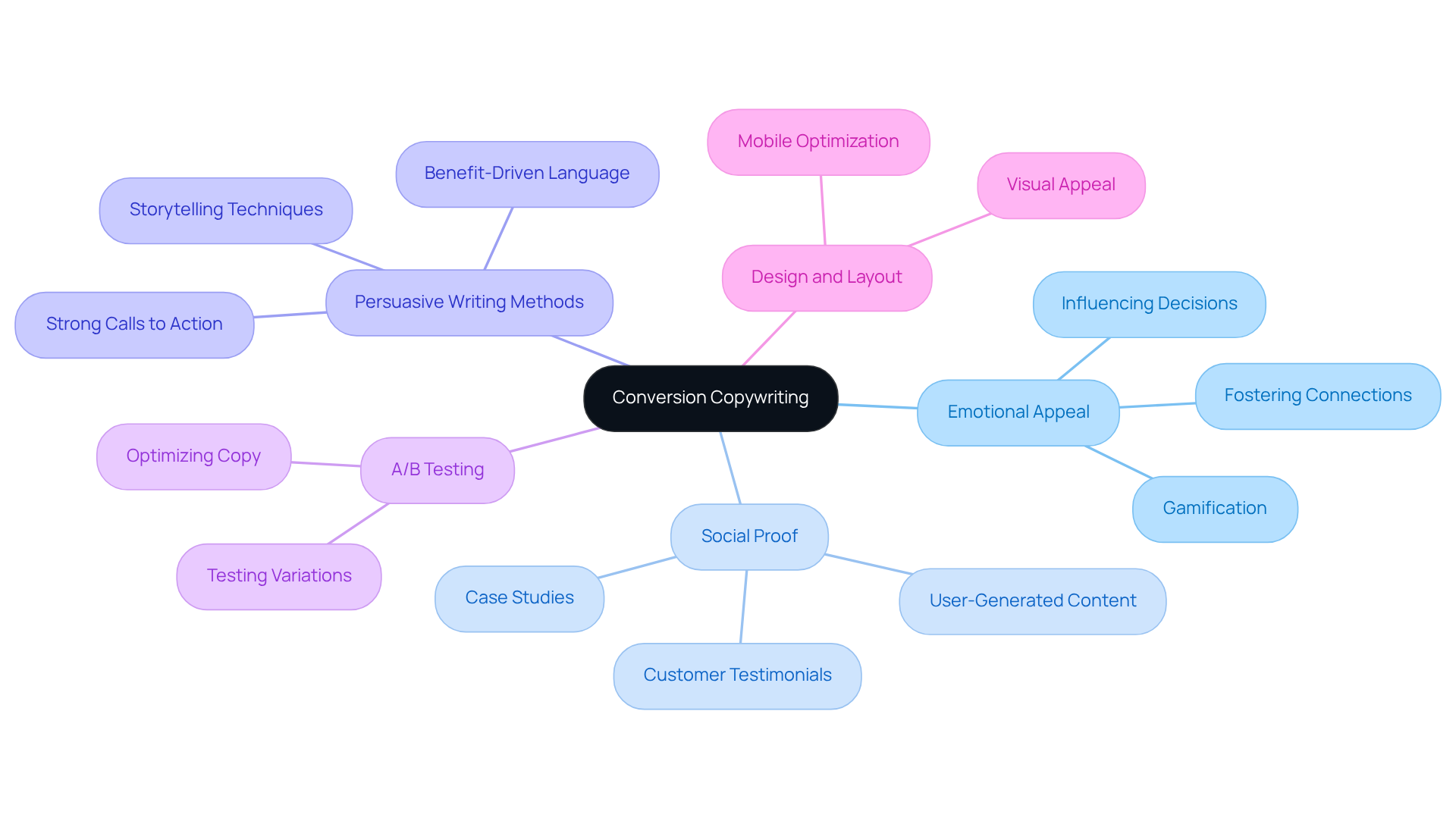
Grammarly: Real-Time Writing Assistance for Persuasion
Grammarly provides real-time writing support that significantly enhances the persuasive writing methods of DTC business owners. By delivering tailored suggestions for grammar, tone, and clarity, it guarantees that messages are not only accurate but also compelling. For DTC owners, leveraging Grammarly can transform their copy into more engaging content through persuasive writing methods, which is vital for converting potential customers into buyers. This improvement in writing quality directly correlates with higher conversion rates, as clear and compelling communication fosters stronger connections with the audience, ultimately driving sales and increasing profitability. In alignment with Parah Group's emphasis on sustainable growth through effective CRO strategies, enhancing writing skills can lead to improved customer engagement and reduced acquisition costs.
To maximize the effectiveness of Grammarly, DTC brand owners should consider the following actionable tips:
- Regularly review AI suggestions for accuracy to ensure alignment with brand messaging.
- Utilize Grammarly's to maintain consistency with brand voice, which is essential for effective communication.
- Engage with the writing community for feedback on AI-generated content, fostering a collaborative approach to enhancing persuasive writing methods.
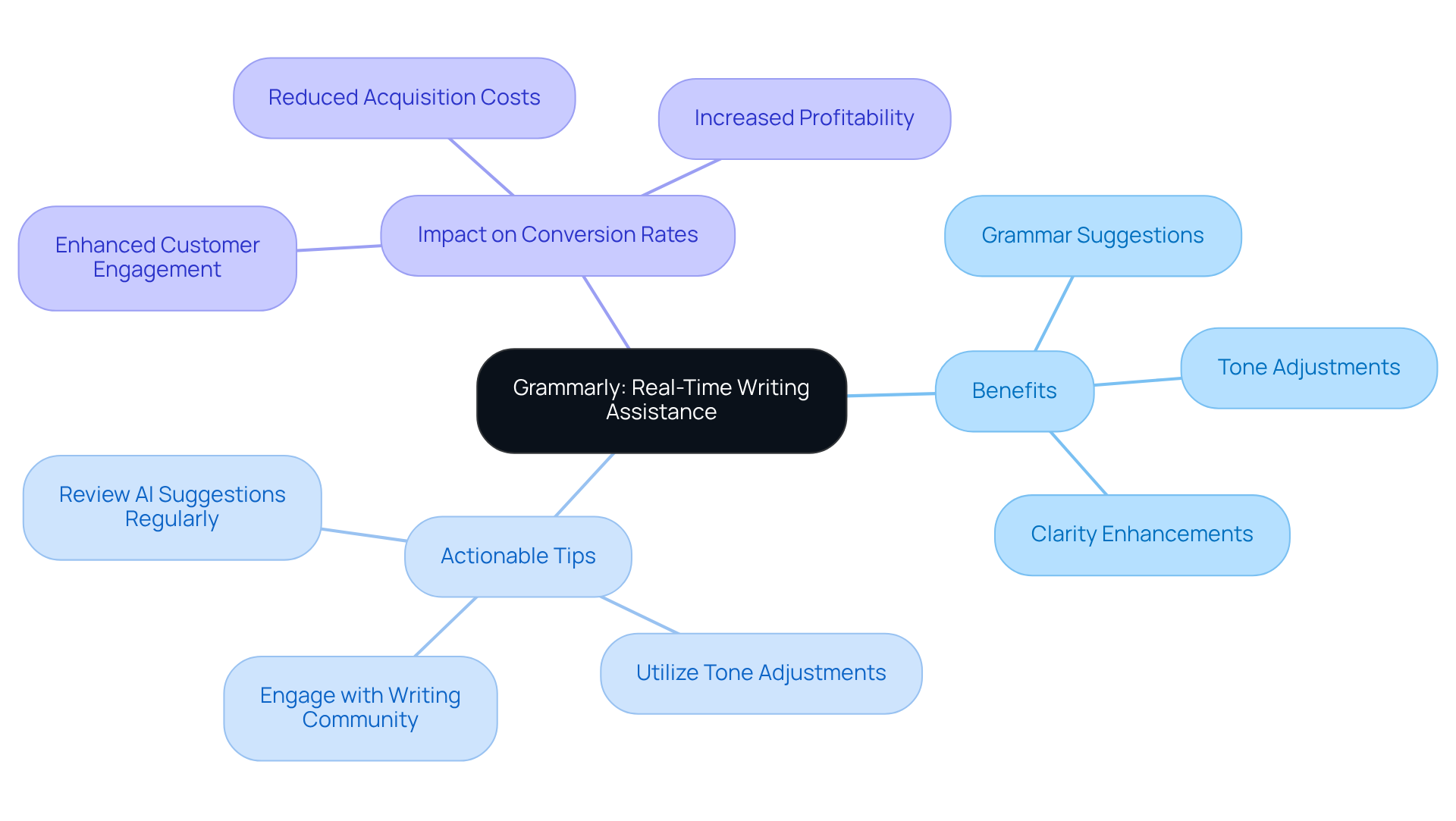
MasterClass: Learn Persuasive Writing from Experts
MasterClass offers courses led by renowned authors and writers, providing invaluable insights into persuasive writing methods. These lessons delve into such as storytelling, emotional appeal, and the effective use of rhetorical devices. For DTC owners, mastering these skills is crucial for crafting compelling narratives that resonate with their target audience.
By leveraging these techniques—optimizing product pricing and introducing gamified elements—companies can significantly enhance their marketing efforts, driving engagement and ultimately boosting conversion rates. Parah Group's case studies reveal that these strategic changes led to a 35% increase in conversion rates and a 10% rise in revenue per visitor for a $30M apparel brand.
According to research, employing persuasive writing methods can significantly enhance your copy’s chances of success. As Robert Cialdini points out, establishing authority in convincing promotion enhances trust and influences consumer choices. By mastering these skills, DTC companies can not only enhance their marketing strategies but also potentially experience a higher ROI from their efforts.
Discover MasterClass today to enhance your compelling writing abilities and achieve improved outcomes for your business.
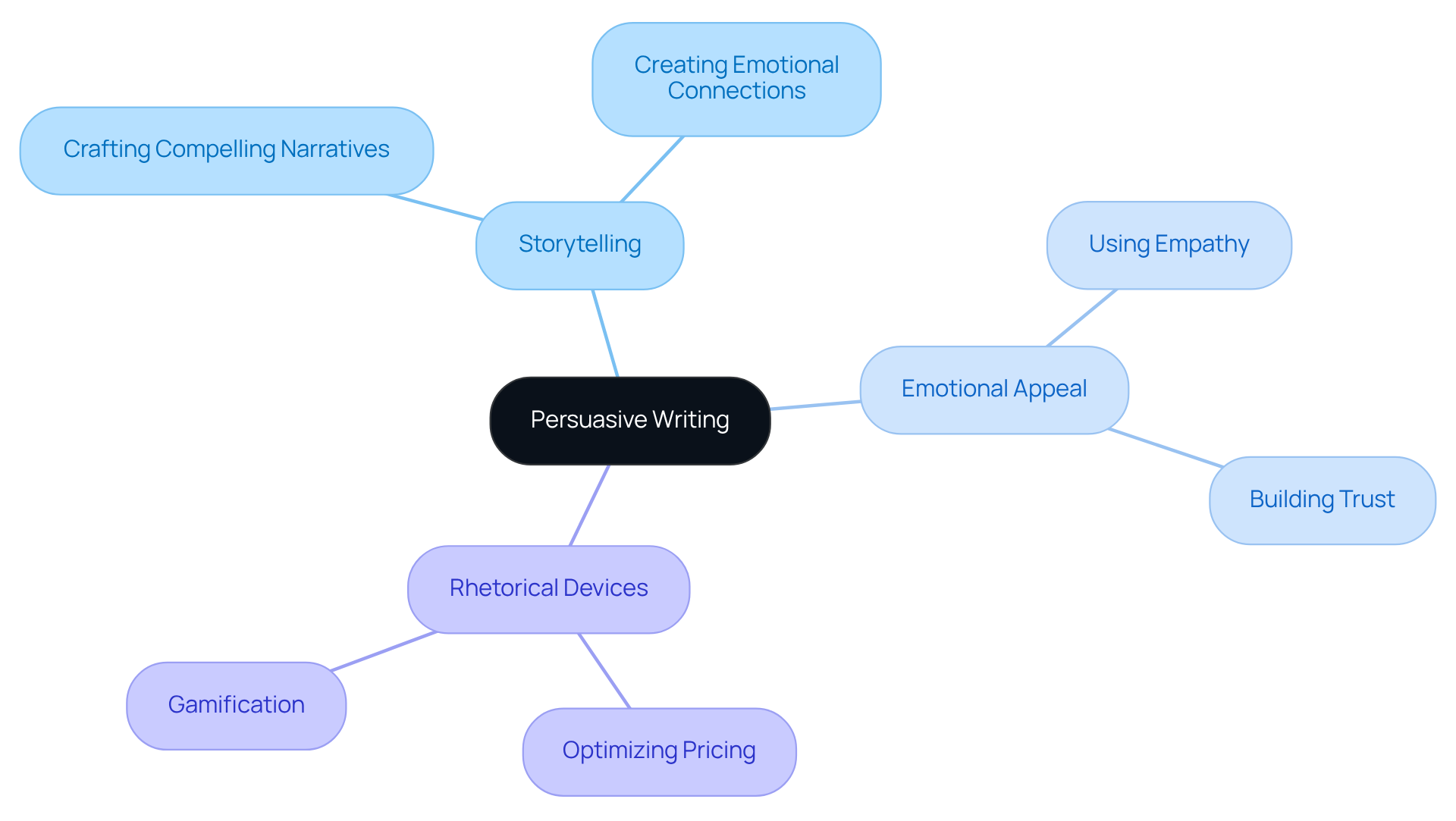
Indeed: Practical Tips and Examples for Persuasive Writing
Effective persuasive writing methods are essential for DTC companies seeking to establish credibility and engage their audience. Key strategies include:
- Establishing Credibility: High ratings and positive reviews significantly enhance brand trust, leading to increased conversion rates. Brands like Glossier effectively leverage user-generated content to cultivate a loyal community, showcasing authentic customer experiences that resonate with potential buyers. Parah Group emphasizes this by implementing strategies that highlight social proof and customer testimonials, which have proven to significantly boost conversion rates.
- Clear Language: Utilizing straightforward language in product descriptions and promotional materials is crucial. Avoiding jargon enables customers to comprehend terms and conditions, fostering trust and reducing barriers to purchase. Studies indicate that a one-second delay in page load time can decrease conversions by 7%, underscoring the necessity for clarity and efficiency in communication. Parah Group’s approach includes optimizing landing pages to ensure clarity and efficiency, directly contributing to improved conversion rates.
- Emotional Appeal: Crafting narratives that evoke emotions can strengthen connections with consumers. For instance, brands like Allbirds effectively employ storytelling to convey their commitment to sustainability, appealing to environmentally conscious shoppers. Parah Group’s case studies illustrate how emotional connections can be enhanced through tailored marketing strategies, leading to increased Average Order Value (AOV) and customer loyalty.
- Persuasive Techniques: Incorporating persuasive words such as 'free', 'because', and 'instantly' can significantly influence buying decisions. DTC companies should leverage social proof, displaying customer testimonials and reviews to reassure potential buyers. Parah Group’s established approaches involve gamifying the shopping experience and executing post-purchase upsells, which have demonstrated enhanced profitability for their clients.
- Examples of Success: Knitwear Co. exemplifies how a strategic digital PR campaign can transform a company's reputation, resulting in increased organic traffic and repeat purchases. Their focus on and community engagement has positioned them as a trusted name in the industry, leading to a doubling of their repeat purchase rate. Similarly, Parah Group’s case studies demonstrate how companies have achieved impressive outcomes through thorough CRO approaches, such as revamping websites to improve user experience and applying effective pricing methods.
By employing persuasive writing methods, DTC companies can amplify their promotional efforts, increase conversion rates, and cultivate lasting customer loyalty, ultimately driving profitability through innovative methods like those provided by Parah Group.
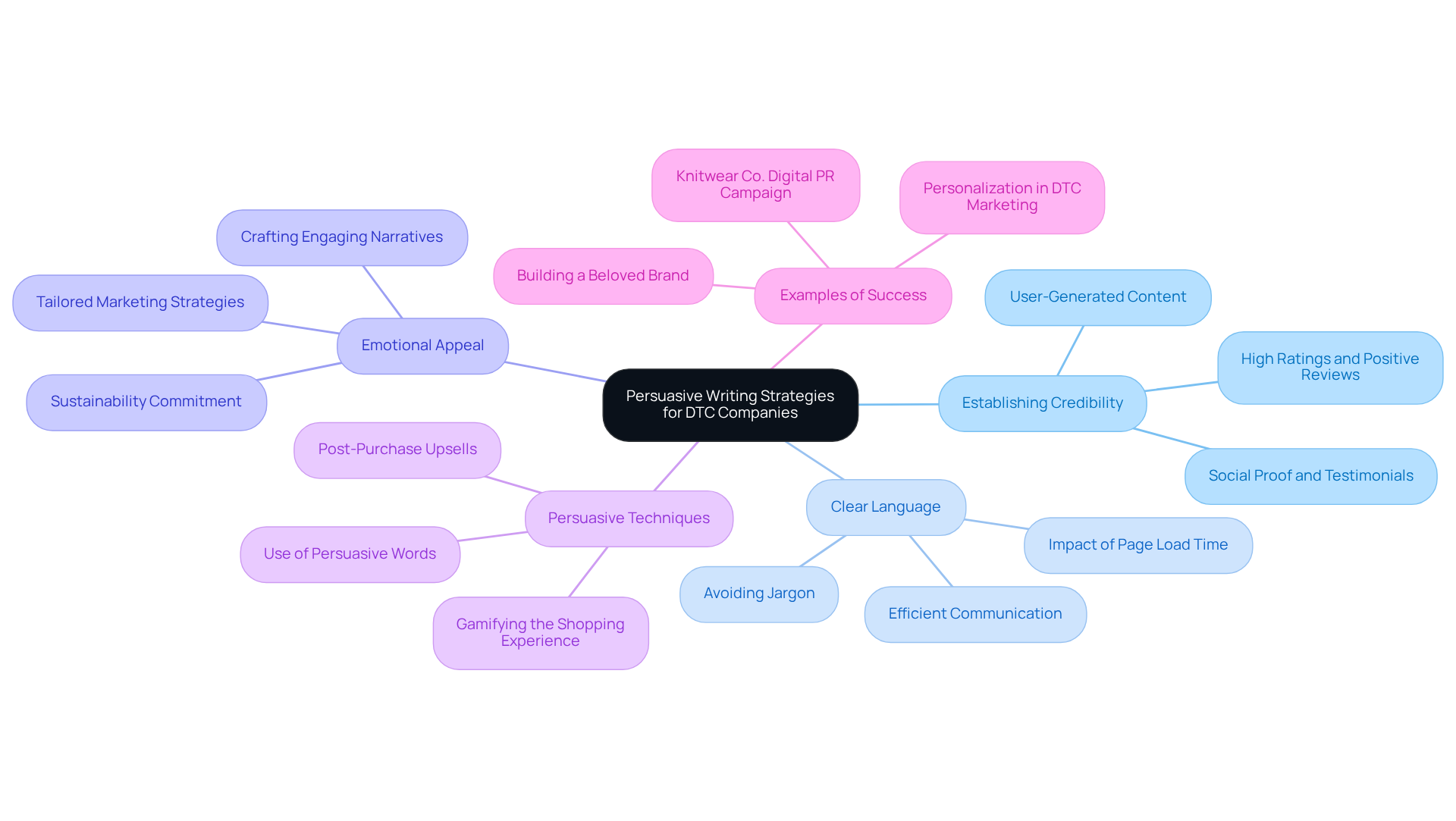
Reading Rockets: Teaching Persuasive Writing Strategies
Cultivating an environment of compelling writing is essential for DTC companies aiming to enhance their promotional effectiveness. By prioritizing training in persuasive writing methods—such as analyzing audience needs and crafting compelling arguments—companies can significantly improve their communication and engagement with customers. This approach empowers team members to create more , aligning messaging with consumer expectations and preferences. Consequently, companies can forge stronger connections with their audience, driving campaign success and fostering long-term customer relationships.
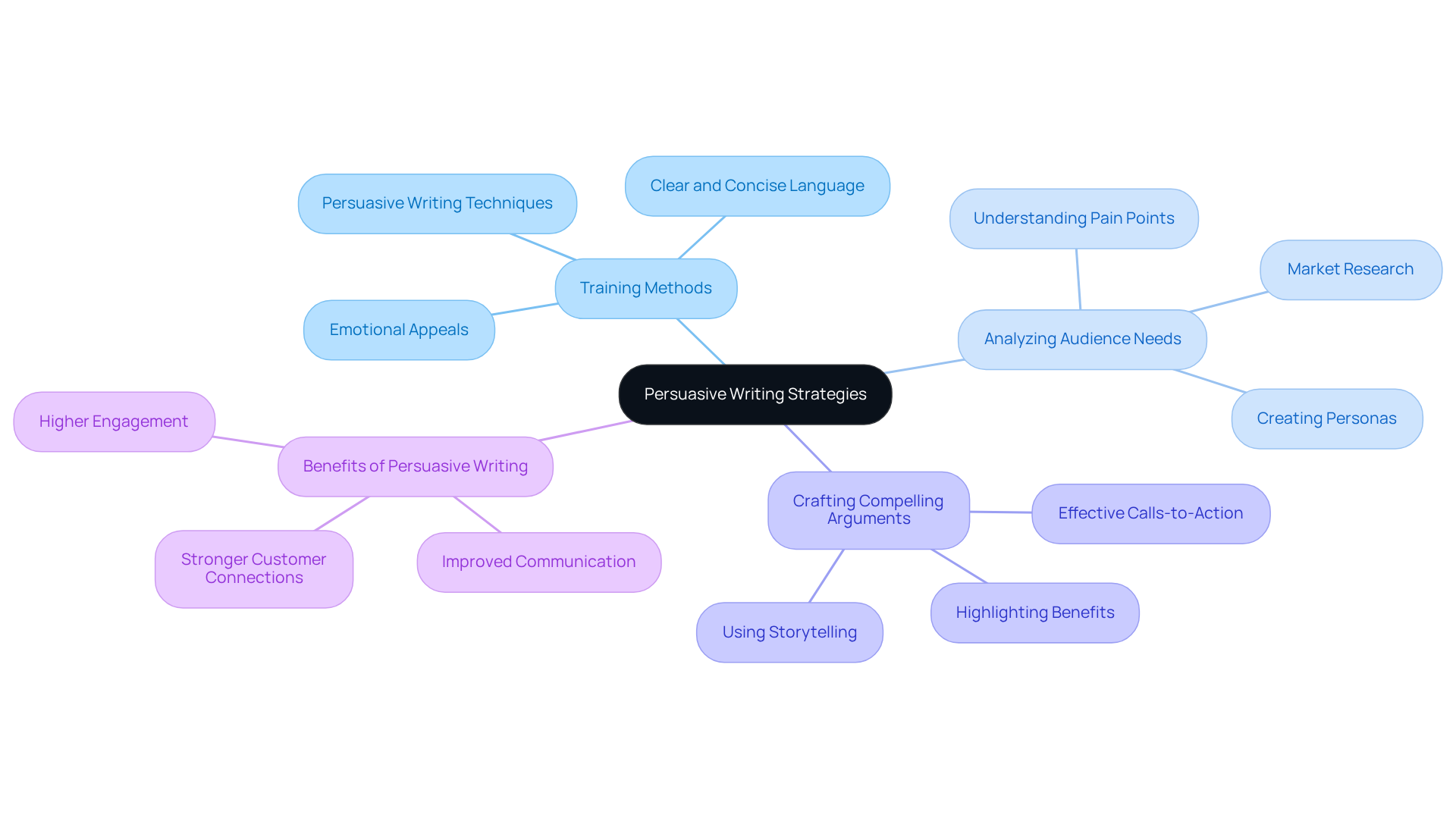
Spacebar Collective: Tone and Vocabulary in Persuasive Writing
Spacebar Collective underscores the pivotal role of tone and vocabulary in employing persuasive writing methods. Selecting the appropriate words and sustaining a fitting tone significantly amplifies the effectiveness of a message. For direct-to-consumer (DTC) brands, aligning tone with identity and audience expectations is vital for crafting compelling content that drives conversions. A comprehensive style guide serves as a crucial tool to ensure consistency in messaging across diverse platforms, thereby reinforcing the organization's voice and values.
Brands like Innocent Drinks serve as prime examples of how a cheeky and friendly tone resonates with their audience, cultivating loyalty and engagement. Similarly, Mailchimp's warm and approachable language demystifies the complexities of email marketing, rendering it accessible to small businesses and bolstering user trust. However, companies must be vigilant in avoiding common tone of voice pitfalls, such as excessive formality or inconsistency, which can alienate their audience.
Aligning tone with organizational identity is not merely advisable; it is essential. This alignment guarantees that messaging is consistent and reflective of core values. For instance, Apple's focus on simplicity and innovation in its communications reinforces its user-friendly image, making complex technology feel intuitive. Such alignment between tone and identity markedly enhances the effectiveness of persuasive writing methods and fosters trust with the audience.
Furthermore, vocabulary choices wield significant influence over consumer perception. Employing clear, concise, and engaging language helps distinguish a company in an overcrowded marketplace. By carefully selecting words that resonate with their target audience, DTC companies can forge emotional connections that transform customers into loyal advocates. To sustain a consistent tone that aligns with audience expectations, companies should routinely review and update their guidelines, ensuring they reflect current values and market trends. Ultimately, the ability to that drives meaningful engagement and conversions is rooted in these foundational principles.
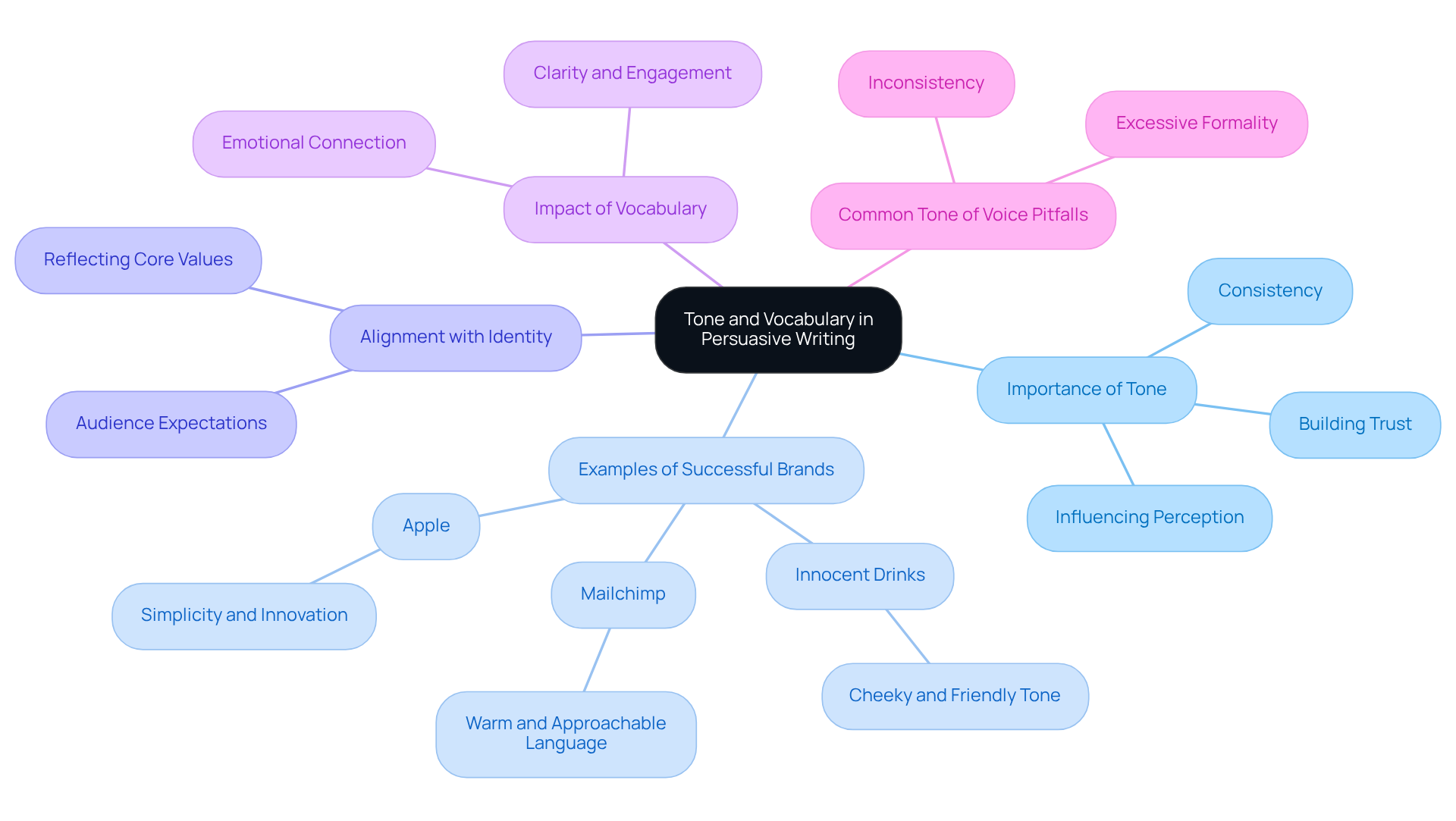
Text Cortex: Types and Techniques of Persuasive Writing
Persuasive writing methods encompass various techniques, notably emotional appeals, logical arguments, and ethical persuasion, all vital for DTC companies aiming to forge connections with their audience. Emotional appeals wield significant power, driving consumer action by engaging feelings that resonate profoundly with potential buyers. Research indicates that 71% of consumers recommend companies based on their emotional perceptions, underscoring the importance of emotional connections in promotional strategies.
While logical arguments contribute to decision-making, their effectiveness is frequently eclipsed by emotional resonance. Advertisements that emphasize rational content achieve a mere 16% success rate, in stark contrast to those that evoke emotions, which can reach a success rate of 31%. This underscores the imperative for DTC companies to harmonize emotional storytelling with logical reasoning to craft compelling narratives.
Numerous examples illustrate successful emotional appeals in DTC marketing. Parah Group's case studies reveal how a $30M clothing label boosted its conversion rate by 35% through strategies that highlighted social proof and gamified the shopping experience. Similarly, a $15M cleaning product brand experienced an 80% increase in average order value (AOV) by introducing free shipping thresholds and product bundling, showcasing the potency of emotional engagement in influencing consumer behavior.
Integrating emotional appeals into marketing strategies not only enhances recall but also propels consumer action. Advertisements that evoke joy or happiness can elevate brand awareness and sharing behavior, while those that elicit sadness can cultivate empathy and inspire charitable donations. Moreover, 48% of respondents indicate they do not feel a connection with a company unless its advertising brings a smile or laughter, highlighting the critical role of emotional engagement in advertising. By comprehending and harnessing these emotional triggers, DTC companies can utilize persuasive writing methods to formulate messages that resonate with their audience, ultimately driving conversions and nurturing long-term loyalty.
To effectively implement these strategies, DTC owners must consistently for emotional impact and refine their messaging to ensure it resonates with their target audience, thereby boosting both engagement and conversion rates.
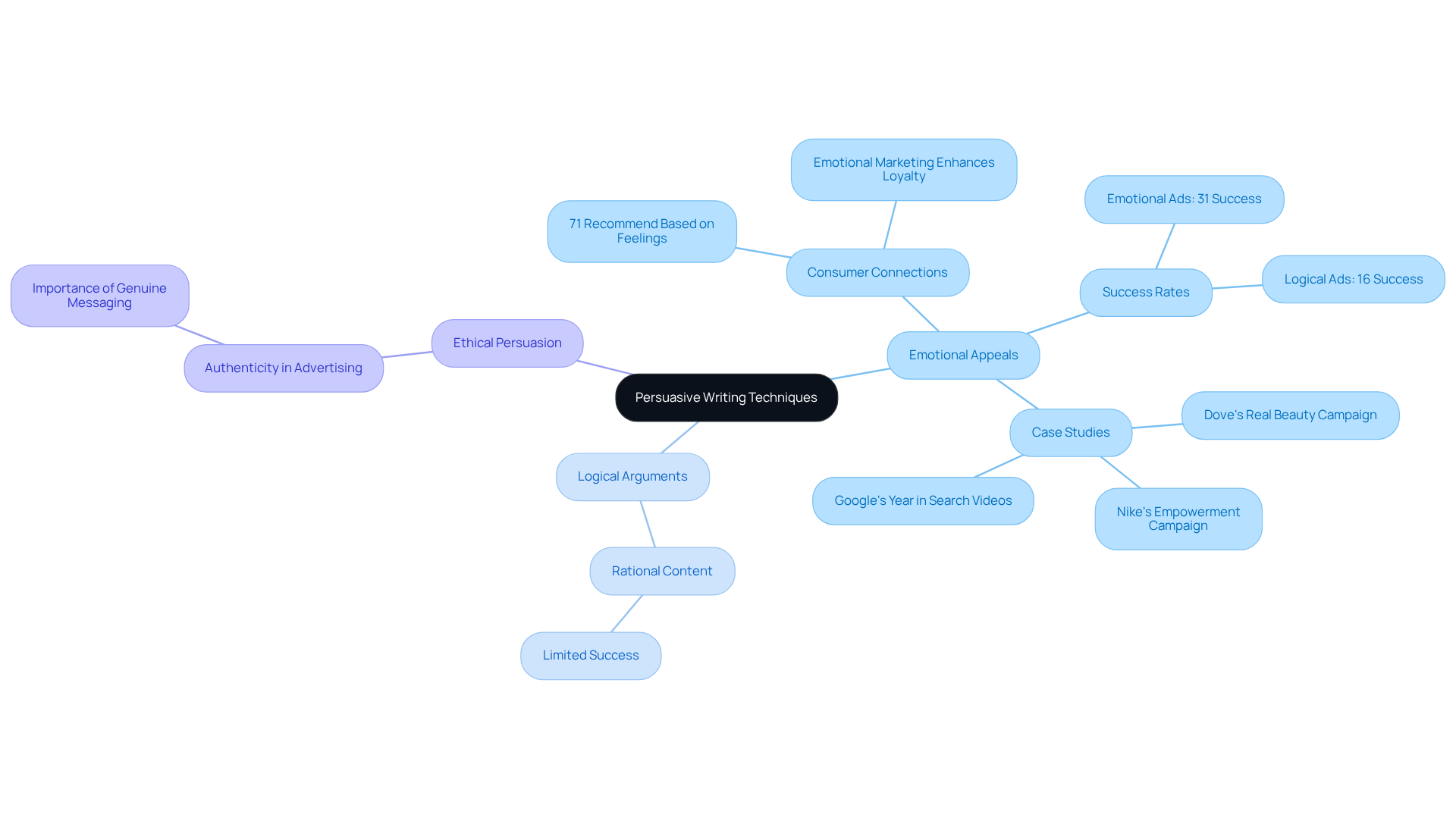
The Good: Aristotle's Persuasive Techniques Explained
Aristotle's three modes of persuasion—ethos, pathos, and logos—are foundational elements for effective communication. Ethos focuses on establishing credibility, ensuring that the entity is perceived as reliable and authoritative. For example, Patagonia exemplifies ethos by demonstrating its commitment to environmental responsibility, thereby building trust among consumers who prioritize sustainability.
Pathos, conversely, appeals to the audience's emotions, forging connections that can drive action. Nike effectively employs emotional storytelling in its campaigns, utilizing pathos to cultivate personal connections with consumers, which significantly enhances conversions.
Logos relies on logical reasoning and factual evidence to persuade the audience through rational arguments. Direct-to-consumer (DTC) companies can leverage persuasive writing methods to craft engaging messages that resonate deeply with their target audience. [Parah Group's five-step approach to Conversion Rate Optimization (CRO)](https://parahgroup.com) illustrates how persuasive writing methods can be utilized to enhance profitability. By focusing on data-driven decisions and rigorous testing, Parah Group aids companies in optimizing their resources, fostering substantial growth and increased conversion rates.
The impact of these persuasive strategies on consumer trust is substantial. When companies employ persuasive writing methods to effectively communicate their credibility (ethos), evoke emotions (pathos), and present logical arguments (logos), they establish a that enhances perception and loyalty. This multifaceted strategy not only improves promotional effectiveness but also boosts conversions, as evidenced by transformative case studies where companies have achieved significant revenue growth and enhanced profitability through innovative CRO methods, often observing increases in revenue per visitor and conversion rates.
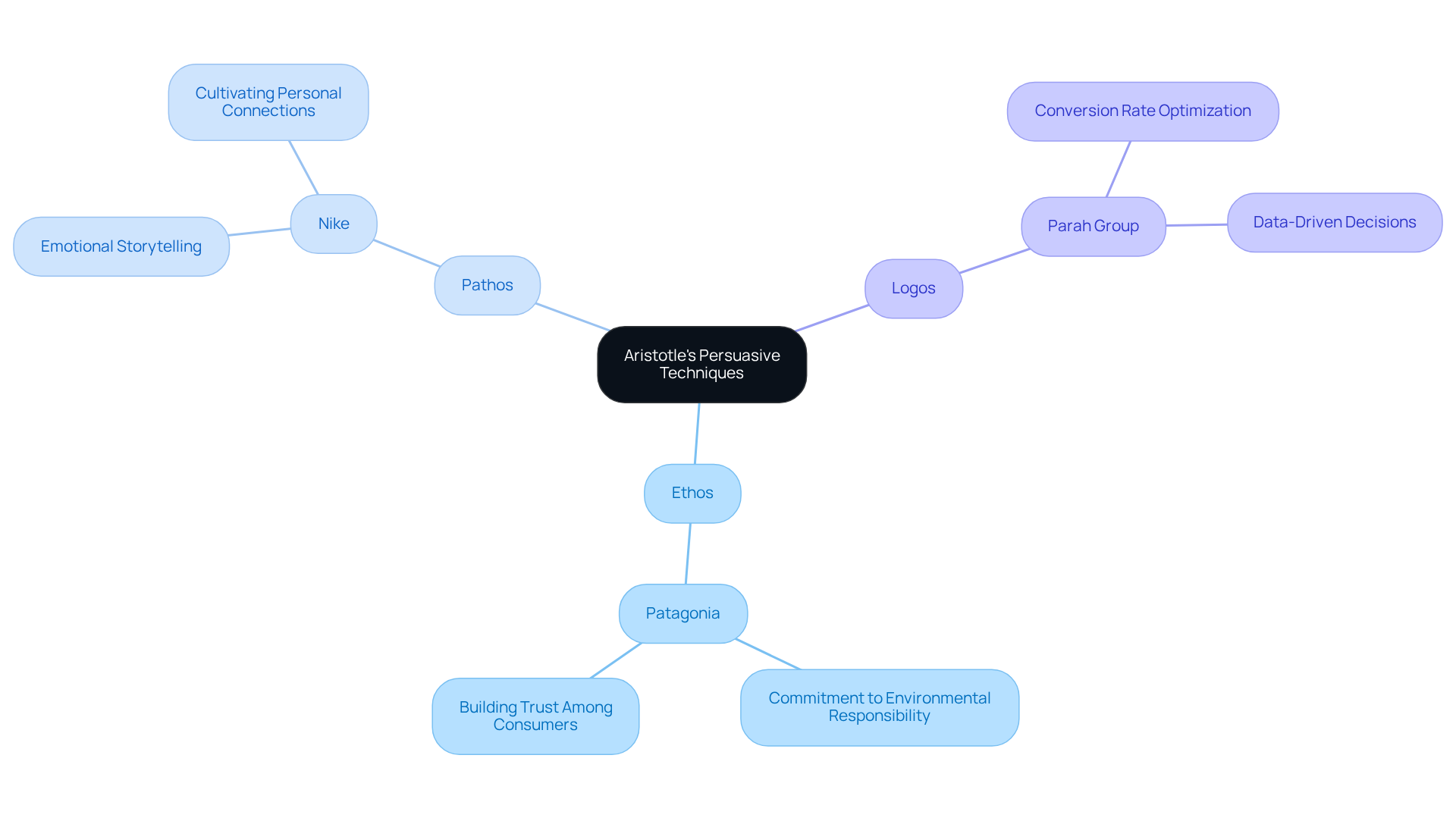
Twinkl: Educational Resources for Persuasive Writing
Twinkl offers a robust selection of educational resources specifically designed for teaching , encompassing worksheets, lesson plans, and practical examples. For Direct-to-Consumer (DTC) companies aiming to refine their promotional strategies, these resources are essential in cultivating a culture of effective communication. By leveraging Twinkl's offerings, companies can markedly enhance their team's writing capabilities, leading to more compelling marketing initiatives. This focus on persuasive writing methods not only bolsters individual skills but also elevates overall team performance, ultimately driving improved engagement and conversion rates.
Moreover, by integrating Parah Group's five-step approach to Conversion Rate Optimization—which involves:
- Comprehending consumer behavior
- Refining landing pages
- Testing various strategies
DTC product owners can optimize profitability through comprehensive methods that align effective writing with consumer psychology. This holistic strategy ensures that marketing communications are not merely captivating but also meticulously tailored for conversion, encouraging business owners to harness Twinkl's resources to foster effective communication and elevate their marketing outcomes.
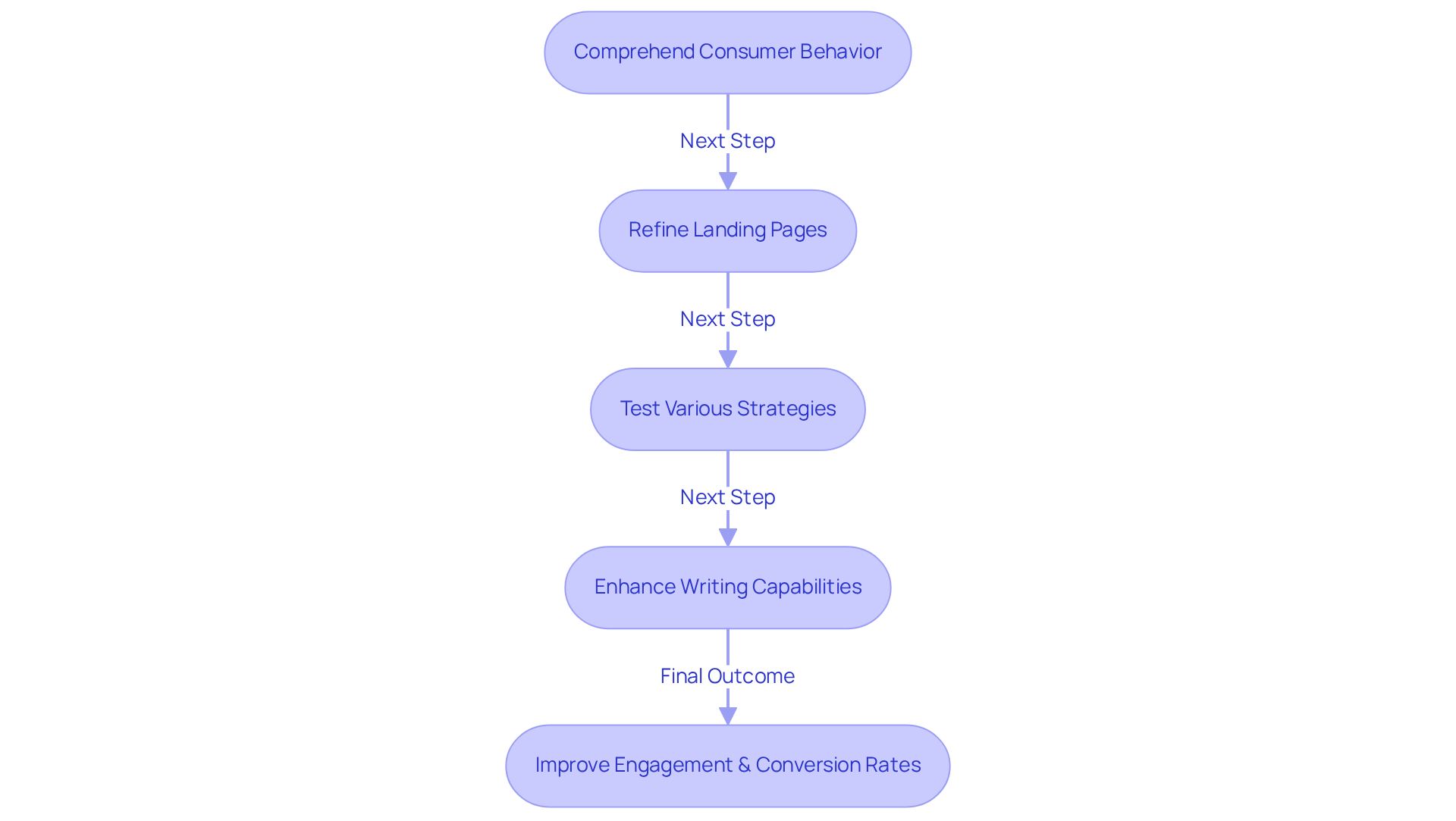
Write to Done: Ethical Techniques for Persuasive Writing
Ethical methods in convincing writing, such as honesty and transparency, are essential for DTC companies aiming to enhance their reputation and cultivate enduring customer relationships. By prioritizing ethical practices, companies can craft compelling content that resonates authentically with their audience. Notably, brands like The Ordinary, Everlane, and Nikin exemplify the power of openness and sustainability in their promotional strategies.
- The Ordinary underscores integrity through accessible formulations and transparent advertising, fostering trust and loyalty among consumers.
- Similarly, Everlane's commitment to environmental responsibility appeals to eco-conscious consumers, thereby enhancing their brand image.
- Nikin further illustrates ethical promotion by engaging in sustainability initiatives, such as planting a tree for every order, which bolsters customer loyalty and strengthens their reputation among environmentally aware consumers.
Transparency not only elevates a company's reputation but also profoundly impacts consumer trust and loyalty. Research indicates that consumers are more inclined to remain loyal to brands that reflect their values, underscoring the critical role of ethical promotion in customer retention. DTC companies that embrace ethical persuasion strategies can utilize persuasive writing methods such as fair pricing, eco-friendly packaging, and truthful product claims to forge a strong emotional connection with their audience. This connection fosters a sense of community, motivating customers to advocate for the brand and engage in word-of-mouth promotion.
Ultimately, by , DTC companies can differentiate themselves in a competitive landscape, paving the way for sustainable growth and a loyal customer base. Statistics reveal that brands implementing ethical marketing practices achieve higher customer retention rates, further highlighting the significance of these strategies in cultivating lasting relationships.

Conclusion
The art of persuasive writing stands as a cornerstone for direct-to-consumer (DTC) brands aiming to enhance their marketing effectiveness and drive sales. By employing essential methods such as emotional appeals, clear language, and ethical persuasion, companies can craft compelling narratives that resonate with their target audience. These strategies not only improve communication but also foster trust and loyalty, ultimately leading to increased conversion rates and customer retention.
Throughout this article, various persuasive writing techniques have been highlighted, including:
- The critical importance of establishing credibility through social proof
- The use of emotional storytelling
- The integration of logical arguments
Successful case studies, such as those from Parah Group, demonstrate how these methods can significantly impact conversion rates and average order value. Tools like Grammarly and educational resources from MasterClass and Twinkl further empower DTC brand owners to refine their writing skills and develop effective marketing strategies.
In a competitive landscape, embracing these persuasive writing methods is not merely beneficial but essential. By aligning messaging with consumer values and preferences, DTC companies can create authentic connections that drive engagement and sales. As businesses navigate the complexities of modern marketing, the commitment to mastering persuasive writing techniques will undoubtedly pave the way for sustainable growth and lasting customer relationships.
Frequently Asked Questions
What is conversion copywriting and why is it important for DTC companies?
Conversion copywriting is a persuasive writing technique that informs and inspires readers to take action. It is important for direct-to-consumer (DTC) companies because it enhances messaging by prioritizing benefits over features, leveraging emotional triggers, and using compelling calls to action.
How can emotional appeal be utilized in copywriting?
Emotional appeal can be used as a persuasive writing method to foster deeper connections with prospective customers, influencing their purchasing decisions and encouraging them to take action.
What are some examples of successful conversion copywriting strategies?
Successful strategies include optimizing the homepage, enhancing social proof (like customer testimonials), and gamifying elements such as progress bars for free shipping. These methods can lead to increased conversion rates and revenue.
What impact did Parah Group have on a $30M clothing label?
Parah Group's collaboration with the clothing label resulted in a 35% increase in conversion rates and a 10% rise in revenue per visitor through effective copywriting strategies.
How did a $15M cleaning product company improve its performance?
The cleaning product company achieved an 80% improvement in average order value by employing strategic pricing, bundling, and post-purchase upsells.
What role does Grammarly play in enhancing persuasive writing for DTC business owners?
Grammarly provides real-time writing assistance by offering tailored suggestions for grammar, tone, and clarity, which helps DTC owners create more engaging and persuasive content, ultimately driving higher conversion rates.
What tips can DTC brand owners follow to maximize Grammarly’s effectiveness?
DTC brand owners should regularly review AI suggestions for accuracy, utilize tone adjustments to maintain brand voice consistency, and engage with the writing community for feedback on AI-generated content.
How can MasterClass help improve persuasive writing skills?
MasterClass offers courses led by renowned authors that teach essential persuasive writing strategies such as storytelling and emotional appeal, which are crucial for DTC owners to craft compelling narratives that resonate with their audience.
What benefits can DTC companies expect from mastering persuasive writing?
By mastering persuasive writing techniques, DTC companies can enhance their marketing strategies, potentially leading to higher conversion rates and return on investment (ROI) from their efforts.
FAQs











